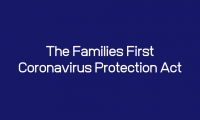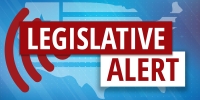
On March 18, 2020, President Trump signed the Families First Coronavirus Protection Act (the “Act”) into law. The Act includes provisions to assist employers and employees during these extraordinary times.
Expansion of Protections Under the Family and Medical Leave Act
For the period of time beginning April 2, 2020 to December 31, 2020, the Act expands the protections of the Family and Medical Leave Act (“FMLA”). Employees may be eligible for a combination of paid and unpaid leave for a period of up to 12 weeks under the FMLA, under certain conditions.
Late Friday, the United States House of Representatives passed the Families First Coronavirus Response Act (the “Act”). The President has tweeted his support of the legislation, and the Senate will take it up this week.
In response to the ongoing COVID-19 crisis, Governor Wolf approved a temporary suspension of the physical presence of notaries for certain real estate transactions on March 25, 2020. The existing law, codified at 57 Pa. C.S. § 306, requires a notary to be physically present when witnessing the executing of documents.
These challenging times present particular challenges to small business. Notwithstanding efforts to stimulate the economy, the fact remains that many businesses simply can’t function at a sustainable level without open doors and customers who require inventory, raw materials or products to sell. Empirical data supports a substantial downturn in gross domestic production such that the federal government has declined to publish economic forecast data for the summer of 2020. Millions have been separated from employment – either temporarily or permanently. Every business and every businessperson has felt the economic effect of the pandemic.
While small business may never be the same, it is not dead. We all know the United States economy is driven by small to medium employers no matter the media focus on big industry. There will no doubt be consolidation in nearly every sector of the economy from construction to retail. History has proven that, for the savvy businessperson, trying times like these bring opportunity. Taking advantage of opportunity requires strong, focused and forward thinking business relationships.
Much has been made and reported about the federal government’s effort to sustain the economy and assist working families through programs such as enhanced unemployment benefits and the Payroll Protection Plan. AMM has assisted many small business owners in negotiating the application process and anticipating both documentary requirements and potential financial consequences of the available programs. State and local governments have also offered programs to the business community. Bucks County has now announced the creation of a new grant funding opportunity: the “Bucks Back to Work Small Business Grant” program. Availability is limited, however, and the application window is small so qualifying business owners must act quickly to obtain a share of the grant fund.
May 14, 2020
Yesterday the Small Business Administration (SBA) issued updates to its Frequently Asked Questions (FAQs) guidance on the Paycheck Protection Plan (PPP) Loans, and added Questions/Answers (Q&A) 45 and 46, with the latter Q&A being directly related to the certification issues, and to the corresponding May 14th deadline for the return of funds as a “safe harbor” from civil and criminal penalties relating to the certification of need.
As previously reported, the PPP applications required borrowers to certify that “current economic uncertainty makes this loan request necessary to support the ongoing operations of the Applicant.” Until its issuance of this Q&A, the SBA’s guidance suggested that it would seek to impose civil and criminal penalties relating to the certification as a first resort, if it determined that the loan was unnecessary. In doing so, the SBA induced a sense of fear; and then further induced a sense of urgency by offering the safe harbor from such penalties, allowing borrowers to return the funds on or before May 7th to avoid such penalties. Such deadline was further extended to May 14th.





